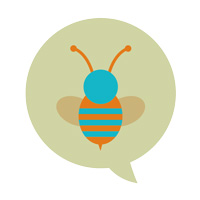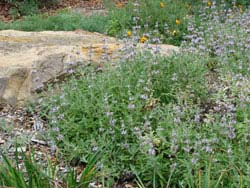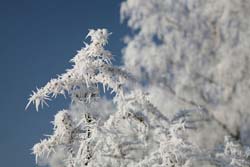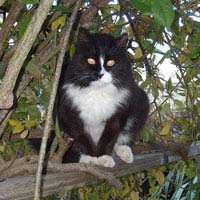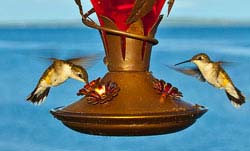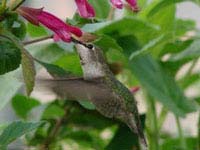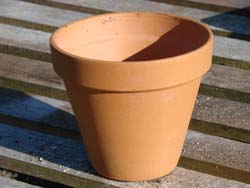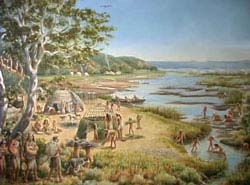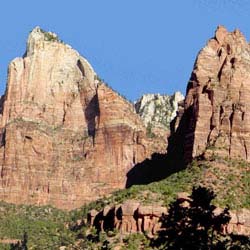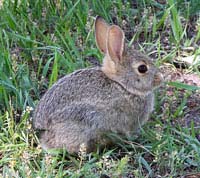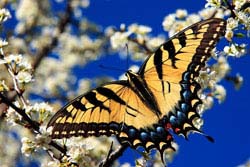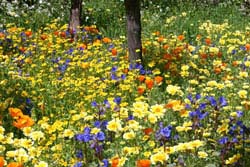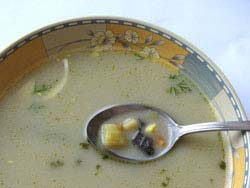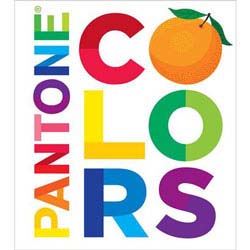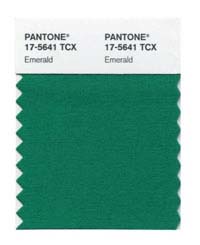
We began publishing our Everything Salvias blog in 2010 for your enjoyment and to help you "get it right" when growing sages that are often unavailable at local garden centers.
It seems like there is an endless bounty of stories to be told. But that's to be expected when covering a genus containing an estimated 900 species -- the largest group within the mint family (Lamiaceae). In addition to Salvias, we write about other species that are either mint family members or low-water companions for our many drought-tolerant Salvias. We welcome comments as well as suggestions for future blog posts.
To access articles rapidly based on your interests, please click on the categories below, which include do-it-yourself videos (Views from the Garden). But please note: This is a dangerous place for a sage lover.
| Explore the Categories: | ||||
| | | | | |
| | | | | |
| | | | | |
| | | | | |
| | | |||
Posted: Friday, March 22, 2013
Synopsis:
Flowers by the Sea is selling "font-style: italic;">Salvia 'Amistad'. It was a mystery sage to University of Buenos Aires agronomy professor Rolando Uria when he encountered it at an Argentinian plant show in 2005. Discovering its extra-long-blooming characteristic along with the intense violet of its large blossoms, he began sharing it with friends and named it Friendship Sage.
Read the Article
Posted: Thursday, March 21, 2013
Synopsis:
Los Angeles Times reporter Emily Green praises Salvia for its beauty, fragrance and drought resistance. She calls it an essential plant in the dry Western garden.
Read the Article
Posted: Monday, March 18, 2013
Synopsis:
In the Rocky Mountain West, conditions can swing from hellishly hot, dry summers to freezing cold winters. Many Southwestern Salvias are ideal for the sunbaked summers but have trouble surviving chilly Zone 5 winters. So we appreciate the cold hardiness as well as the drought resistance of one of our newest hybrid cultivars, Ultra Violet Hybrid Sage (Salvia lycioides x greggii ‘Ultra Violet’).
Read the Article
Posted: Saturday, March 16, 2013
Synopsis:
Got shade? Go ahead and get blue about it in the garden. We'll hold your hand, listen to your concerns and help you pick just the right shady salvias in hues to match the 2013 designer colors Dusk Blue and Monaco Blue from Pantone.
Read the Article
Posted: Wednesday, March 13, 2013
Synopsis:
Bog Sage is a terrific plant for damp soil and stormy weather, such as powerful "pineapple express" events.
Read the Article
Posted: Sunday, March 3, 2013
Synopsis:
Farms need cats to keep rodents under control. Feisty Felix is the king of mousing in the greenhouses of Flowers by the Sea.
Read the Article
Posted: Thursday, February 28, 2013
Synopsis:
Sometimes it is difficult for hummingbirds to get all the nectar they need from the garden, even if you have many Salvias. Hummingbird feeders supplement mother nature and attract a crowd of the Family Trochilidae. Water features, including misters, are also good attractants. However, both feeders and water features need to be kept clean so they don't harm hummers.
Read the Article
Posted: Sunday, February 24, 2013
Synopsis:
Planting a hummingbird garden filled with nectar-rich, long-blooming Salvias aids preservation of hummingbird species that migrate each year throughout North America. It also gives you a front-row seat to a fascinating aerobatics show. Backyard islands of colorful sages are like gas stations for hummingbirds' long-distance journeys. Salvias can keep your garden whirring with the helicopter-like flight of hummingbirds from spring through autumn and -- in warm climates -- into winter.
Read the Article
Posted: Saturday, February 23, 2013
Synopsis: Flowers by the Sea welcomes the Google "Go Paperless in 2013" initiative. From our viewpoint, it particularly highlights the need for commonsense actions, such as not publishing print catalogs. But the initiative isn't catching on fire.
Read the Article
Posted: Wednesday, February 13, 2013
Synopsis:
Growing a one-pot herb garden indoors is a fragrant reminder of summer. While some herbs need plenty of water, others - such as Culinary Sage (Salvia officinalis spp.) - need little. Aside from controlling soil moisture, keys to success include plant selection, pot size and drainage, appropriate potting mix, sufficient sunlight and indoor pruning to control growth.
Read the Article
Posted: Sunday, February 10, 2013
Synopsis:
Less than 250 years ago, Black Sage and White Sage also helped feed and heal the Tongvas and other Southern California native peoples. Here is their story.
Read the Article
Posted: Friday, February 8, 2013
Synopsis:
You don’t have to be a fine artist to create a work of beauty in the garden. By selecting hardy, vibrantly colored native Salvias that can withstand Southwestern weather ranging from sullen heat and drought to raging rainstorms, you become a landscape painter. FBTS Online Nursery carries many choices for your palette.
Read the Article
Posted: Tuesday, February 5, 2013
Synopsis:
If rabbits are destroying your flower beds, plant Sage. They don’t like the flavor.
Read the Article
Posted: Wednesday, January 30, 2013
Synopsis:
Sage is the common name for the uncommonly beautiful Salvia genus. But when designers describe a product as being sage-colored, they mean a shade of gray-green that they say is soothing and that harmonizes with a multitude of colors, including soft pastels, hot oranges and deep purples. A version of sage called "Grayed Jade 14-6011" is one of the Pantone color-matching system's top shades for the design industry this year. This post identifies some Grayed Jade plants in the Flowers by the Sea collection. They are fine peacemakers amid a Salvia garden based on a mixture of Pantone's top greens for 2013, which you can read about in previous articles from our Pantone Pageant series of designer colors in the landscape.
Read the Article
Posted: Monday, January 28, 2013
Synopsis:
You may have better luck finding the Two-tailed Tiger Swallowtail among your Salvias than pronouncing its many long names.
Read the Article
Posted: Monday, January 21, 2013
Synopsis:
Flowers by the Sea grows Salvias that are already popular in the Southeast as well as others we would like to introduce to gardeners seeking thirsty flowering plants that can also adjust to dry spells. Many are fine choices for Florida hummingbird gardens. Our suggestions are organized into categories based on moisture tolerance – average and ample -- as well as sun requirements.
Read the Article
Posted: Wednesday, January 16, 2013
Synopsis:
Gardeners interested in developing wildlife habitat on balconies or in backyards can acquire certification
Read the Article
Posted: Sunday, January 13, 2013
Synopsis:
Don't expect a catalog in your mailbox from Flowers by the Sea, because we have never printed one and refuse to do so. Print catalogs are tree-munching dinosaurs on their way to extinction due to the rapidly changing world of digital technology. Online catalogs are environmentally friendly and save our customers money, because we can keep our plant prices low.
Read the Article
Posted: Friday, January 11, 2013
Synopsis:
Potato-vegetable soup containing lots of fresh Sage is a good cold-weather meal.
Read the Article
Posted: Thursday, January 10, 2013
Synopsis:
Salvias thrive in many different climates and parts of the world. Consequently, those who love the genus are an international tribe stretching from Alaska to Argentina and from South Africa to Southern California. Members of the tribe, from Salvia experts to home gardeners, will gather March 7 to 9 at Huntington Botanical Gardens in San Marino, California, for Salvia Summit II. Speakers will include academics, horticulturists, researchers and a forensic scientist specializing in Salvia chemistry. This event follows up on Salvia Summit I, which was held in 2008 on California's Central Coast at Cabrillo College.
Read the Article
Posted: Monday, January 7, 2013
Synopsis:
Lime is the kind of bright, cheerful color that practically shouts, “Hey, look at me!” Limelight Mexican Sage (Salvia Mexicana ‘Limelight’) is the kind of plant that makes you say, “Hey, look at that! Let’s plant it.” It brightens the landscape with its startling contrast of chartreuse-lime foliage and deep violet-blue flowers. Limelight is a poster plant for “Tender Shoots 14-0446” by Pantone color corporation.
Read the Article
Posted: Saturday, January 5, 2013
Synopsis: In 1814, physician and herbalist Nicholas Culpeper wrote about ancient remedies made from Sage.
Read the Article
Posted: Wednesday, January 2, 2013
Synopsis:
Emerald and other cool shades of green are among the hot colors for 2013, according to Pantone, a design-industry leader. Flowers by the Sea doesn't generally think of greens or of any colors in nature as being in or out. However, we think it is fun and fresh to consider garden design from a different perspective. Emerald is Pantone's top color for the year. This article about emerald-colored Salvias begins a pageant of sorts down the runway of our blog, showing how the Pantone color matching system can be used to shape landscaping decisions.
Read the Article
Posted: Monday, December 31, 2012
Synopsis:
Have you double checked your USDA plant hardiness zone. You may be able to grow plants you weren’t possible in your area.
Read the Article
Posted: Sunday, December 30, 2012
Synopsis:
Salvias that grow well in Florida may behave differently from one region of the state to another. This may mystify gardeners who have just moved to Florida or have moved to a different area in the state. Based primarily on seasonal variations in temperature, the four main regions are North, Central, South and Tropical Florida.
Read the Article







